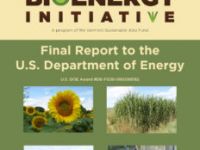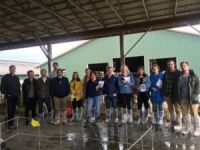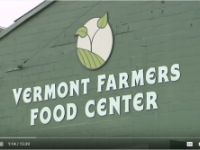Vermont Bioenergy Initiative Overview
Vermont Bioenergy Initiative
Vermont farmers, entrepreneurs and researchers are building an alternative model of bioenergy production that is small-scale, community focused, economical, and sustainable.
Algae to Biofuel
Vermont researchers and entrepreneurs demonstrate their innovations in algae to biofuel research and development in the Northeast.
Grass Fuel
Grass Fuels
Heating fuels from switchgrass? Sid Bosworth, a University of Vermont agronomist explains switchgrass production followed by biomass entrepreneurs turning bales of grass into briquette fuel.
Making On-Farm Biodiesel
Making on-Farm Biodiesel
Grow oil crops, make biodiesel, feed the animals & save money! Vermont farmer and owner of State Line Biofuels John Williamson and University of Vermont Extension's Chris Callahan show us how.












